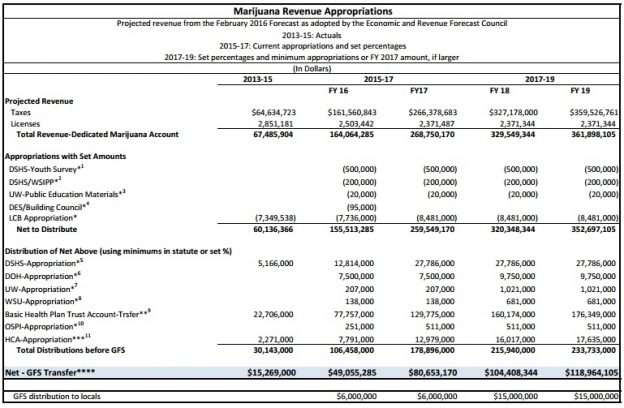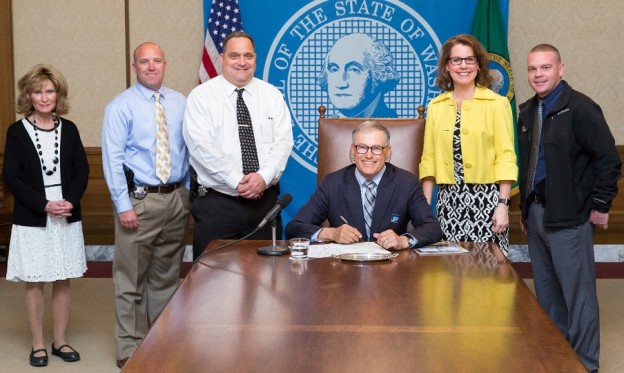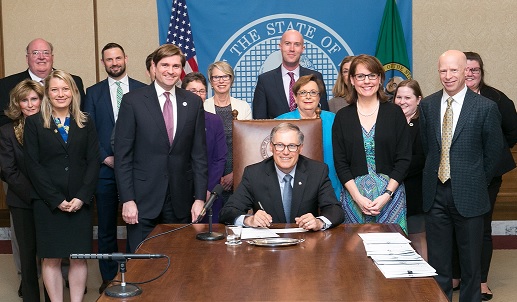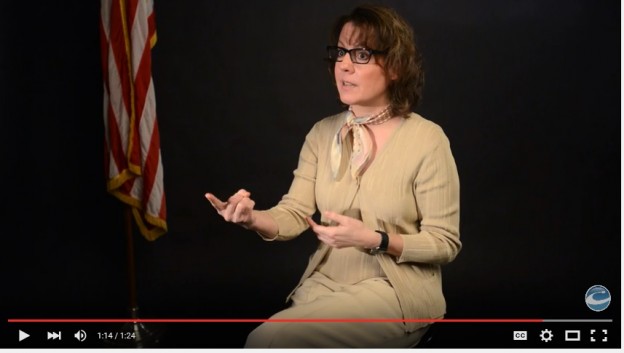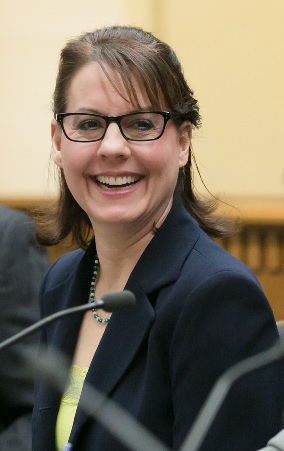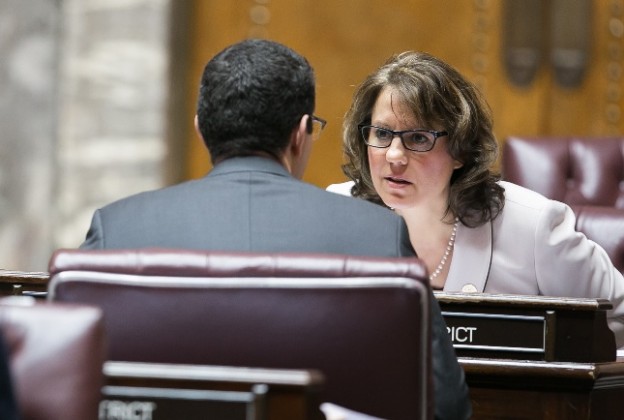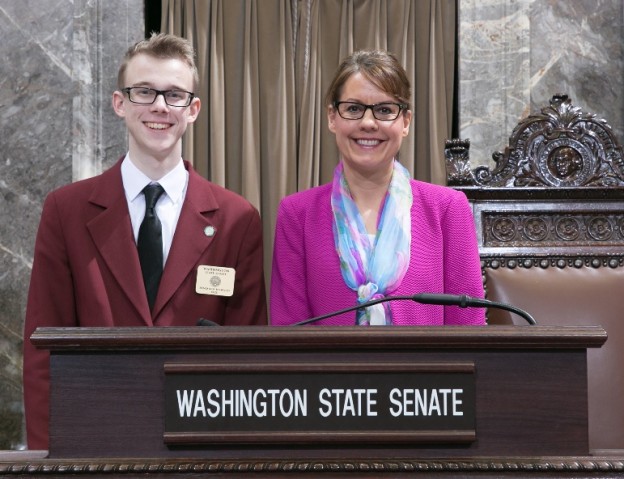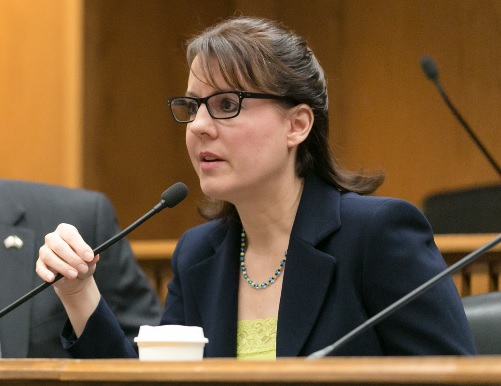I’ve received a number of questions regarding marijuana revenue. I’m sharing a helpful document prepared by the Office of Financial Management that lists how much marijuana revenue was collected in 2013-15, how much marijuana revenue budget writers can anticipate through 2019 and where it all goes.
Tag Archives: ann rivers
Some great things have happened since my colleagues and I reached a no-new-taxes bipartisan budget update and adjourned for 2016. My fourth-grade friends from Captain Strong Elementary School in Battle Ground visited our state Capitol and my bill that makes our communities and law enforcement officers safer was signed by the governor.
Read more here!
It was 2011, and Clark County detective Jason Granneman was fed up. As a law-enforcement officer he came into daily contact with individuals who were serving the remainder of their sentences in the community, instead of behind bars, sometimes for months or even years. Officially they are in “community corrections” status; however, because they are under the sole supervision of the state Department of Corrections, Granneman and his law-enforcement colleagues refer to them as “DOC active.”
Granneman was fed up because state law prohibited him from detaining, searching or arresting DOC-active persons. It didn’t matter if they violated the signed agreement setting the terms of their community release, which could mean staying away from certain places or certain people or avoiding alcohol or other conditions, depending on the case. Even alerting DOC that someone under its supervision wasn’t upholding his or her signed accountability agreement resulted in limited action.
Spurred by the memory of the four Lakewood police officers who were murdered in November 2009 by an individual under community-corrections supervision, Granneman came to a realization: if someone was going to make a change, it would have to be him.
Taking his idea to the Capitol, Granneman immediately met unexpectedly fierce resistance from DOC, as well as many legislators. Looking back, he admits the first draft of the policy change he proposed was too broad.
The idea was shelved until, in 2015, Granneman met with his neighbor Sen. Ann Rivers and explained how the hands-off approach to DOC-active persons was creating not only a public-safety hazard, but also putting law-enforcement officers at greater risk. They began to work together on a more focused solution and a strategy for securing legislative approval.
“The state had put the public’s first line of defense directly in harm’s way. Jason and other officers were encountering DOC-active folks every day but lacked the tools to appropriately deal with those who had gotten out of line. This is the kind of public-safety issue that makes my job in Olympia truly meaningful, so I got on board immediately with what he wanted to achieve,” said Rivers, R-La Center. “It seemed like a no-brainer to simply allow law enforcement officers to partner with their DOC counterparts and make sure people follow the rules while serving out their sentences.”
Despite the new collaboration between senator and sheriff’s deputy, the updated policy proposal was once again greeted with contention from DOC.
Unwilling to back down, Rivers got Granneman, key lawmakers and representatives of DOC and the Washington Council of Police and Sheriffs together in a room and began hammering out a solution acceptable to all sides.
Granneman describes the end result as “a game changer” – Senate Bill 6459, which was filed by Rivers and won overwhelming legislative approval in early March. Signed April 1 by Gov. Jay Inslee, the new law allows a law-enforcement officer to notify DOC when persons under community-corrections supervision violate the terms of their release. Additionally, law enforcement is now permitted to detain, search and make arrests on new crimes when committed by a DOC-active individual.
“It was a challenge to reach an agreement that brought everyone on board, but the final product will be a force-multiplier for the entire state of Washington,” Granneman said. “Now law enforcement has shared authority with DOC and the benefit is going to be huge. This will mean more safety for communities and for the officers who run across people who are serving community corrections, because it holds those offenders accountable.
“My peers and I appreciate Senator Rivers’ willingness to take on this issue,” Granneman added. “Without her tenacity it would have remained just an idea.”
PHOTO CAPTION: Jason Granneman (on Gov. Inslee’s left) and members of Clark County’s law enforcement community join Sen. Rivers at a ceremonial bill signing Monday.
Sometimes, it seems as though the state government — split between Republicans and Democrats — is incapable of bringing about real change, when it comes to basic, common sense legislation that protects taxpayer money.
That was the case during the 2015 legislative session when lawmakers were unable to renew a bill reauthorizing the Medicaid Fraud False Claims Act, a measure that makes so much sense it was almost nauseating to see it go unsigned into law.
The legislation allows the state Attorney General’s office to combat Medicaid provider fraud. It’s often seen when medical providers attempt to profit off the state’s Medicaid program by knowling providing unnecessary tests or procedures or charging for services that were never provided.
Across the state, such fraud has been seen in hospitals, school districts and private companies. What all the cases have in common is the rampant misuse of taxpayer money.
The Medicaid Fraud False Claims Act, championed by Attorney General Bob Ferguson, authorizes the office to bring civil cases against the fraudulent providers.
According to Ferguson: “Since 2012, the Attorney General’s Office has recovered $6.1 million that it otherwise would not have been able to without its authority under the FCA. If the FCA had not been renewed, Washington could have lost significant federal dollars. The federal government provides a $3-to-$1 match for all state moneys provided to the AGO to enforce the False Claims Act. The state would have also lost its full partnership with the National Medicaid Fraud Control Units, reducing its ability to be fully represented in large, national Medicaid fraud cases. Whistleblower protections provided by the FCA would have also disappeared.”
Fortunately, lawmakers came together to pass the legislation at the close of the recent session, which stretched 20 days passed the original deadline.
And we have a local legislator to thank.
Sen. Ann Rivers, R-La Center, sponsored the bill signed into law two weeks ago by Gov. Jay Inslee.
“This legislation represents the kind of common-sense measures that taxpayers wish lawmakers would champion more often,” said Rivers. “I am honored to be part of ensuring that this cost-savings and consumer-protection act remains strong.”
Senate Bill 6156 did a great deal more than simply reauthorize the act.
It improved it.
The legislation removes the sunset provision for the majority of the Fraud Claims Act, giving the Attorney General’s office more breathing room to launch investigations rather than lobby lawmakers to give them the tools to do so.
Without the support of Rivers and other sponsors, the False Claims Act would have expired at the end of June.
That would have been devastating to the integrity of the Medicaid reimbursement program in our state. Since 2012, when the act became law, “civil fraud recoveries have increased 28 percent, and the state has recovered $3 for every $1 invested in enforcement under the act,” according to Ferguson.
“I am committed to protecting taxpayers from fraud and abuse,” Ferguson said. “Thanks to action by the Governor and the Legislature, my Medicaid Fraud Control Unit can continue recovering stolen dollars lost to fraud, deterring misuse of government funds, and holding fraudsters accountable.”
Rivers is right.
The legislation is a common sense measure of the type residents wish to see much more often.
We’re thankful for Rivers leadership on this issue, and we look forward to seeing misappropriated Medicaid funds returned to the state coffers where they belong.
The original article, published April 13, 2016, can be viewed here.
I recently sat down with The Columbian to share my thoughts on education funding. See the quick one-minute video here.
It took an additional 20 days for the Democrats in the House of Representatives to drop their pursuit of new taxes and agree to an operating-budget update that was restrained in its spending, contained no new taxes and balanced over four years, as state law requires.
In my latest e-newsletter I cover the highlights of the 2016 session and also honor my friend and community leader, John McKibbin. You can read more here.
As you are likely aware, just before calling for a 30-day special session, the governor made good on his threat to veto bills that had been sent to his desk for his signature. Is not doing his job really the best way to motivate lawmakers to do theirs? Read more about budget negotiations, bills vetoes and local kids who visited Olympia here.
Benjamin Howard, a sophomore at Battle Ground’s CAM Academy, spent a week working as a page for the Washington State Senate at the Capitol in Olympia. Benjamin was one of 29 students who served as Senate pages for the eighth week of the 2016 legislative session.
He was sponsored by 18th Legislative District Sen. Ann Rivers, Senate majority whip.
“Benjamin is bright young man and he has a promising future ahead of him. It was a pleasure to have him here in the Capitol and I appreciate all the work he did for us,” said Rivers, R-La Center.
The Senate Page Program is an opportunity for Washington students to spend a week working in the Legislature. Students are responsible for transporting documents between offices, as well as delivering messages and mail. Pages spend time in the Senate chamber and attend page school to learn about parliamentary procedure and the legislative process. Students also draft their own bills and engage in a mock session.
“Being in a place where you casually see senators or the governor walking around is such a cool experience,” said Benjamin about some of the highlights of his week at the Capitol.
Benjamin enjoys reading, playing video games and acting. He recently was in a play of Shakespeare’s “Taming of the Shrew” at his local high school. Benjamin played the part of Biondello who is as Benjamin puts it is the “thinking man’s clown.”
Benjamin, 16, is the son of Michael and Angela Howard of Battle Ground.
Students interested in the Senate Page Program are encouraged to visit: https://leg.wa.gov/Senate/Administration/PageProgram/
A bill to create a statewide tracking system for rape kits that allows law enforcement and victims to track the status and location of kits has passed the Legislature and is headed to the governor’s desk for his signature.
“This bill is about justice and transparency, and it’s a critical step in rape kit reform to support survivors of sexual assault,” said Rep. Tina Orwall, D-Des Moines, of her legislation that makes Washington state the first in the nation to put this kind of tracking process in place. “The system will be an important resource for law enforcement to ensure testing accountability of both old and new kits, and for victims to have peace of mind being able to verify that the investigations on their cases are moving along.”
House Bill 2530 requires the Washington State Patrol to create and operate a statewide Sexual Assault Kit Tracking System and authorizes the Department of Commerce to accept private donations to fund the testing of new rape kits, as well as training for Sexual Assault Nurse Examiners (SANEs).
Orwall acknowledged that getting this bill through the process was possible thanks to having worked closely with key lawmakers in both chambers and from both sides of the aisle.
“Victims of sexual assault can now be assured that everything that can be done to bring justice is being done. This bill represents the great work that comes from a bipartisan group of legislators coming together and doing what is right,” said Sen. Ann Rivers, R-La Center, who sponsored the Senate companion, SB 6484.
“With the passage of this bill, Washington will be a national leader in ensuring survivors of sexual assault and rape get their best chance at justice,” said co-sponsor of the Senate bill Sen. Pramila Jayapal, D-Seattle. “Having served on the task force last interim that helped develop this policy, we heard first-hand the traumatic experiences of these survivors. Not only do they have to go through the initial trauma, they then have to go through an invasive procedure to gather evidence for a rape kit – only to find out later nothing has come of it. This is unacceptable. I want to thank Rep. Orwall for her leadership on this issue and look forward to continuing to work together to support survivors in Washington.”
WSP may use a phased implementation process to launch the tracking system, but by June 1, 2018, local law enforcement agencies, prosecutors, hospitals, and the WSP must be fully participating in the system.
In addition to the rape kit tracking system, the Legislature also passed House Bill 2711, sponsored by Rep. Gina McCabe, R-Goldendale, which will commission a study to determine the availability of Sexual Assault Nurse Examiners in Washington, and make recommendations for improvements. According to McCabe, SANEs are a vital component to ensuring sexual assault survivors receive necessary care.
“Sexual assault survivors deserve safe environments and critical care where they feel respected and well-served,” said McCabe. “SANEs play an important role in providing care. We must continue seeking options to increase the number of SANEs available, especially in rural areas that have limited services.”
SANEs provide necessary examinations and follow-up appointments for survivors of sexual assault, and provide specialized skills helpful in prosecuting criminals. The study will be conducted by the Office of Crime Victims Advocacy.
Reps. Tina Orwall and Gina McCabe, and Sens. Pramila Jayapal and Ann Rivers are members of the Sexual Assault Forensic Examination (SAFE) Best Practices Task Force. These two bills constitute the first part of their work plan as they address the 6,000 untested kits, and work to develop a victim-centered approach to support survivors of sexual assault.











